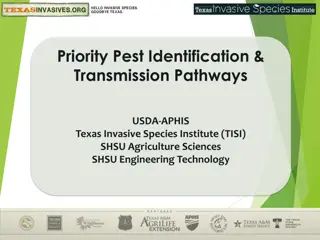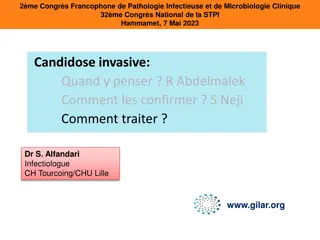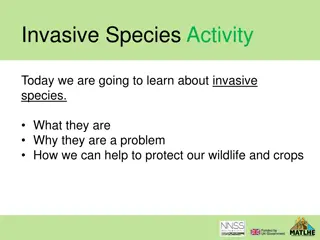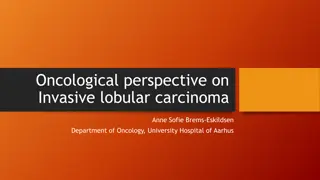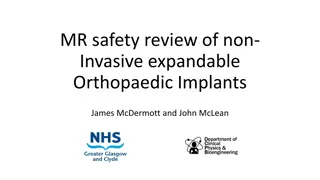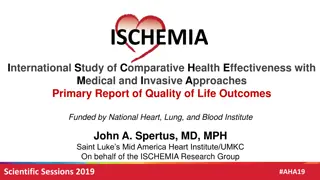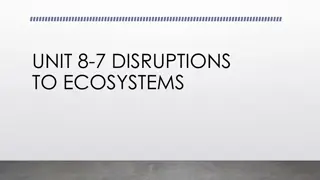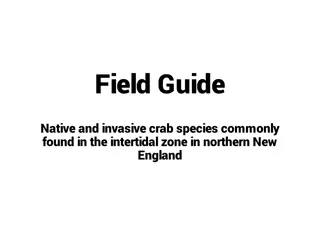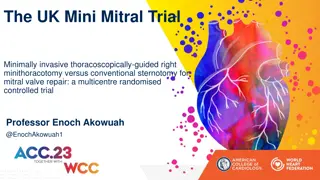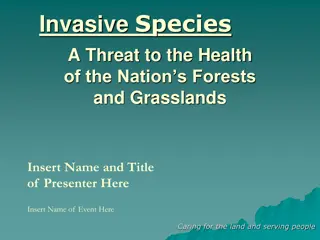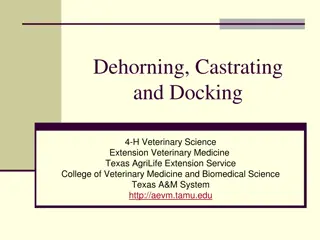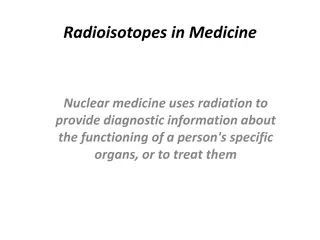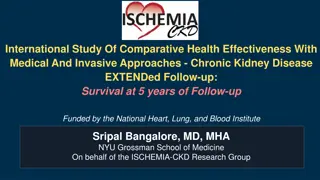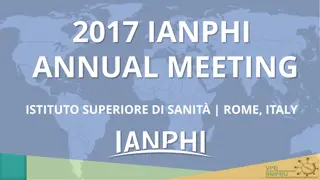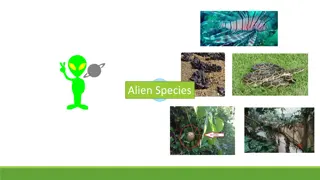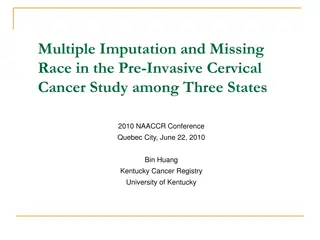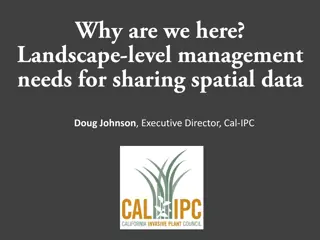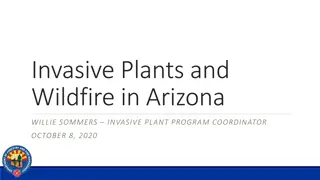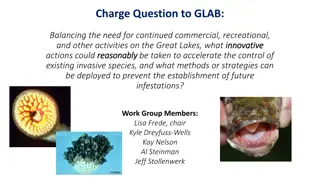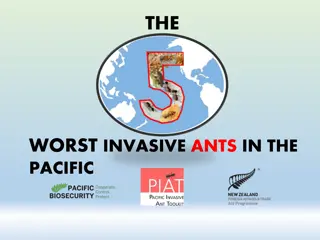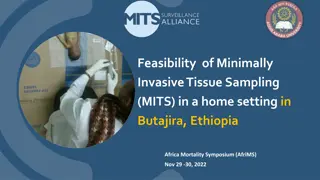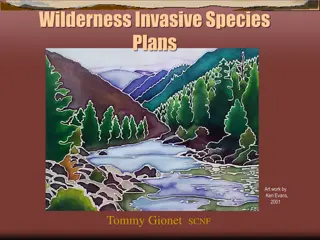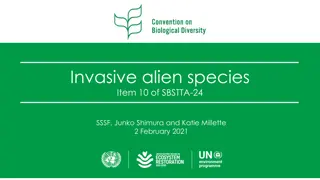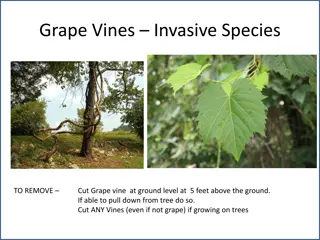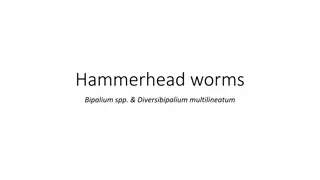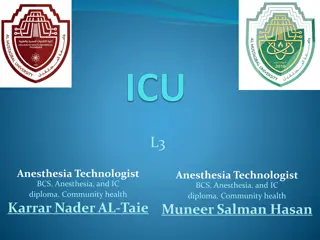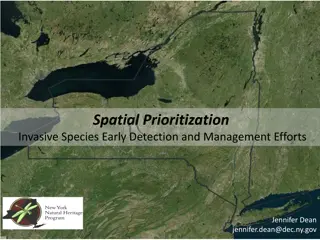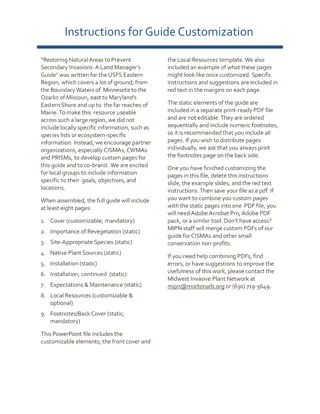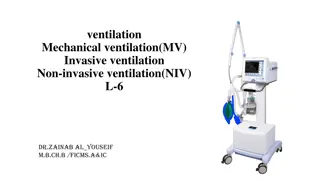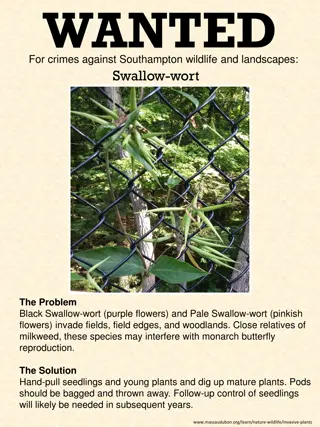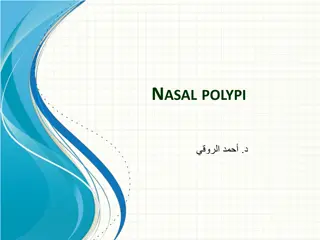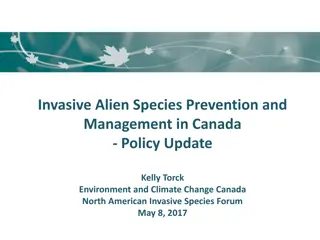Minimally Invasive Surgery Conference | 21st - 22nd March 2024
The field of surgery has undergone a revolutionary transformation with the introduction of new technologies and surgical techniques. One significant advancement is the utilization of robotic systems such as the Da Vinci system, which has greatly enhanced minimally invasive surgery (MIS).\n\nRegister
1 views • 5 slides
Understanding Invasive Species Transmission Pathways
Explore the identification and transmission pathways of priority pests, focusing on the measures like plant pest analysis, survey enhancement, and rapid response capabilities for invasive species management. Delve into the critical role of human interactions in creating pathways for invasive species
2 views • 17 slides
Advances in Invasive Candidiasis Management: Insights from the 32nd National Congress in Hammamet
The 32nd National Congress discussed important aspects of invasive candidiasis, including diagnosis, treatment, and mortality rates. Key points included clinical presentations, treatment strategies, and mortality correlations with underlying conditions and time to treatment initiation. Various recom
6 views • 29 slides
Understanding Invasive Species in Northwest Michigan
Explore the impact of invasive species in Northwest Michigan through images and data on habitat support for butterfly and moth species, the transition of non-native plants to becoming native, and the definition of what makes a species invasive. Learn about the threats posed by non-native species and
4 views • 15 slides
Understanding Invasive Species: Threats and Solutions
Learn about invasive species, their impact on native wildlife and crops, and how we can protect our ecosystems. Discover the difference between native and invasive species through engaging activities on Montserrat island.
6 views • 50 slides
Tracking the Spread of Invasive Spotted Lanternfly: A Project Proposal Presentation
The project aims to monitor and predict the spread of the invasive Spotted Lanternfly in the United States using dataset lydemapr and process-based modeling. The impact of SLF on plant species and outdoor activities is significant, making it crucial to implement proactive measures. Machine learning
0 views • 8 slides
Oncological Perspective on Invasive Lobular Carcinoma: Challenges and Response to Chemotherapy
Guidelines and characteristics of invasive lobular carcinoma, focusing on oncological challenges, response to chemotherapy, and prognosis after neo-adjuvant treatment in patients. Highlights the importance of considering histology type for tailored treatment decisions. Discusses the effectiveness of
0 views • 20 slides
MRI Safety Review of Non-Invasive Expandable Orthopaedic Implants
This review discusses the safety considerations surrounding non-invasive expandable orthopaedic implants, focusing on the potential challenges these dynamic implants pose during MR imaging. It highlights the distinction between passive and dynamic implants, emphasizing the need for accurate identifi
0 views • 12 slides
POSNOC & ATNEC Trials Update by Amit Goyal: Investigating Axillary Treatment in Breast Cancer
POSNOC (Positive Sentinel Node) and ATNEC trials are investigating the effectiveness of axillary treatment in women with early-stage breast cancer having metastases in one or two sentinel nodes. Led by Chief Investigator Amit Goyal in the UK, this randomized controlled trial compares adjuvant therap
1 views • 21 slides
Comparative Health Effectiveness Study: Quality of Life Outcomes with Medical and Invasive Approaches
This primary report funded by the National Heart, Lung, and Blood Institute presents the International Study of Comparative Health Effectiveness with Medical and Invasive Approaches. The research evaluates whether an invasive strategy improves health status in stable patients with moderate ischemia,
1 views • 21 slides
Understanding Disruptions to Ecosystems and Human Impact
Evolution and ecosystem dynamics are shaped by interactions between organisms and their environment. Invasive species, unintended consequences, and human activities can disrupt ecosystems, leading to ecological changes. Examples include the impact of invasive species like zebra mussels in the Great
0 views • 12 slides
Field Guide to Native and Invasive Crab Species in Northern New England Intertidal Zone
This field guide provides detailed information on native and invasive crab species commonly found in the intertidal zone in northern New England. It includes identification features and distinctions among the species, serving as a useful tool for conducting intertidal green crab quadrat surveys. The
0 views • 4 slides
UK Mini Mitral Trial: Minimally Invasive Thoracoscopic Approach vs Conventional Sternotomy for Mitral Valve Repair
The UK Mini Mitral Trial compares the outcomes of minimally invasive thoracoscopic-guided right minithoracotomy versus conventional sternotomy for mitral valve repair. The trial aims to determine if physical function improvement post-surgery at 12 weeks is superior in the minimally invasive approach
1 views • 24 slides
Impact of Pneumococcal Conjugate Vaccines on Invasive Pneumococcal Disease in Ireland
Comparing data from Jan-Dec 2018 with the same period in 2008, the Irish Pneumococcal Reference Laboratory found an overall 10% increase in invasive pneumococcal disease in Ireland. Notably, there was a significant decline in children under 5 years of age, with a 100% reduction in cases due to PCV7
0 views • 24 slides
Managing Invasive Species to Safeguard our Forests
Invasive species pose a significant threat to the health of our nation's forests and grasslands, causing ecological, biological, and economic losses. This presentation highlights the impact of invasive species and underscores the importance of collaborative efforts to effectively combat this problem
2 views • 14 slides
Livestock Handling and Care Techniques for Calves, Lambs, and Pigs
Learn about dehorning, castrating, and docking procedures for livestock such as calves, lambs, and pigs. Understand the benefits of these techniques and various methods used for each process. Discover restraint methods, non-invasive and invasive procedures, and tools commonly employed in veterinary
0 views • 25 slides
Applications of Radioisotopes in Nuclear Medicine
Nuclear medicine utilizes radioisotopes to provide crucial diagnostic information about the functioning of specific organs and to treat various conditions. Diagnostic techniques in nuclear medicine involve using radioactive tracers that emit gamma rays from within the body. Positron Emission Tomogra
0 views • 19 slides
Comparative Study on Health Effectiveness in Chronic Kidney Disease
Study focuses on the benefits of adding cardiac catheterization and revascularization to medical therapy in stable CKD patients with moderate ischemia. The ISCHEMIA-CKD trial compared invasive versus conservative treatment strategies, enrolling high-risk patients with various comorbidities. Results
2 views • 21 slides
Minimally Invasive Tissue Sampling in CHAMPS - Improving Child Health Data
The 2017 IANPHI Annual Meeting held in Rome, Italy showcased the role of Minimal Invasive Tissue Sampling (MITS) in utilizing data for action in Child Health and Mortality Prevention Surveillance (CHAMPS) South Africa. The meeting focused on objectives like under-5 mortality analysis, validation of
0 views • 24 slides
The Impact of Invasive Species on Biodiversity and Ecosystems
The introduction of foreign species can have detrimental effects on biodiversity, ecosystems, and even humans. Invasive species like the Sea Lamprey and Burmese Python disrupt natural habitats, leading to a decline in biodiversity and posing risks to native species and human populations. However, th
0 views • 13 slides
Addressing Missing Race Data in Pre-Invasive Cervical Cancer Study
Study discusses missing race data in pre-invasive cervical cancer cases among three states and the impact on analysis. It highlights the concept of multiple imputation to handle missing data effectively, providing insights into data mechanisms and methods to treat missing values.
0 views • 25 slides
Addressing Invasive Plant Species in California
Executive Director Doug Johnson of Cal-IPC discusses the challenge of 200 invasive plant species across California's vast land, requiring spatial prioritization for eradication and containment. The solution involves aggregating digital datasets, collecting expert knowledge, assessing priorities base
0 views • 21 slides
Managing Invasive Plants and Wildfire in Arizona
The Invasive Plant Grant Program in Arizona is actively combating invasive plant species to prevent wildfires and preserve ecosystems. State funds are allocated for projects targeting species like Saltcedar and Buffelgrass. Grant criteria and projects in 2019 and 2020 reveal a focus on eradicating n
0 views • 19 slides
Understanding Invasive Plants and Vegetation Management
Explore the world of invasive plants with a focus on policy, restoration, and management strategies. Learn about the characteristics that make a plant invasive, federal definitions, and the impact of climate change on invasive species. Dive into case studies on Spartina species, Scotch broom removal
0 views • 39 slides
Study on Active Smoking and 30-Day Wound Events post Minimally Invasive Inguinal Hernia Repair
This study by Ivy N. Haskins, MD, analyzes the association between active smoking and 30-day wound events following minimally invasive inguinal hernia repair. It explores the necessity and feasibility of preoperative smoking cessation, involving a detailed analysis of 2,652 inguinal hernia repairs,
0 views • 13 slides
Innovative Strategies for Managing Invasive Species in the Great Lakes
Balancing commercial, recreational, and other activities on the Great Lakes requires innovative actions to control existing invasive species and prevent future infestations. The work group focuses on defining AIS, evaluating vectors/pathways, current prevention strategies, accelerating control metho
0 views • 9 slides
Exploring the Top 5 Invasive Ant Pests in the Pacific
Discover the top 5 invasive ant species affecting agriculture and the environment in the Pacific: African big-headed ant, Red imported fire ant, Little fire ant, Argentine ant, and Yellow crazy ant. Explore their impact on people, agriculture, and the natural ecosystem, and learn about their life cy
0 views • 14 slides
Feasibility of Minimally Invasive Tissue Sampling (MITS) in Home Setting in Butajira, Ethiopia at Africa Mortality Symposium
Neonatal mortality and stillbirth rates are significant in Ethiopia, highlighting the need for effective strategies like Minimally Invasive Tissue Sampling (MITS). This study aims to assess the feasibility of implementing MITS in home settings in Butajira through a detailed analysis of objectives, m
0 views • 14 slides
Understanding the Impact of Invasive Species in Wilderness Management
Invasive species pose a significant threat to the ecosystem by causing disruptions in biodiversity and ecosystem health. This article discusses the importance of managing invasive species in wilderness areas and provides insights into creating successful Invasive Species Plans. It sheds light on the
0 views • 22 slides
Global Efforts in Managing Invasive Alien Species
Status reports on invasive alien species worldwide, including findings on successful eradications, regulations in various countries, and outcomes of online forums discussing technical guidance for managing invasive species under the CBD. Efforts include the development of tools, guidance, regulation
0 views • 10 slides
Invasive Plant Species Removal Guide
Learn how to effectively remove invasive plant species such as grape vines, garlic mustard, Japanese barberry, honeysuckle, and multiflora rose with detailed instructions and images for each species. Take necessary steps to remove these invasive species to protect native plant biodiversity.
0 views • 5 slides
Hammerhead Worms: Invasive Species Identification and Overview
Invasive terrestrial flatworms known as Hammerhead Worms, including species like Bipalium spp. and Diversibipalium multilineatum, have been introduced to various regions, likely through soil or potted plants. Five invasive species have been identified, each with distinct characteristics and sizes. W
0 views • 9 slides
Understanding Mechanical Ventilation in Anesthesia Technology
Mechanical ventilation plays a crucial role in assisting patients with breathing difficulties by delivering oxygen and removing carbon dioxide. It involves two primary types: Negative Pressure Ventilation (NPV) and Positive Pressure Ventilation (PPV). NPV helps patients with conditions like chronic
0 views • 19 slides
Prioritizing Invasive Species Management Efforts in New York State
Jennifer Dean, in collaboration with NYS DEC and SUNY ESF, leads spatial prioritization efforts to focus on invasive species detection and management in protected areas, high conservation value zones, recreation destinations, and high-risk areas. Through innovative mapping resources and stakeholder
0 views • 30 slides
Northwest Michigan Invasive Species Network Overview
The Northwest Michigan Invasive Species Network (ISN) is a Cooperative Invasive Species Management Area dedicated to managing invasive species in northwest Michigan's natural areas. Founded in 2005 and funded through grants and private donations, ISN collaborates with over 60 partners to address inv
0 views • 5 slides
Ventilation in Critical Care: Basics and Calculations
Understanding mechanical ventilation is crucial in managing critically ill patients. This content covers concepts like I:E ratio, total cycle time calculation, inspiratory and expiratory times, and practical examples. Learn how to adjust ventilator settings based on patient parameters and conditions
0 views • 11 slides
Understanding Central vs Peripheral Blood Pressure: Clinical Relevance
Central vs peripheral blood pressure differences have clinical implications as systolic pressure amplification occurs due to changes in arterial stiffness moving away from the heart. Central pressure measurements, more closely related to cardiovascular events, provide valuable insights for assessing
3 views • 25 slides
Invasive Plants Wanted for Crimes Against Southampton Wildlife
In Southampton, invasive plant species like Black Swallow-wort, Barberry, Japanese Knotweed, Oriental Bittersweet, and Multiflora Rose pose threats to local wildlife and landscapes. These plants spread rapidly, impacting natural habitats and ecosystems. To combat this, manual removal methods and car
0 views • 5 slides
Understanding Nasal Polypi and Their Classifications
Nasal polyps are simple oedematous growths in the nasal mucosa that can be unilateral or bilateral. They are classified into simple nasal polyps, fungal polyps, and malignant polyps. Simple nasal polypi, also known as inflammatory polyps, include ethmoidal polyps and antrochoanal polyps. Fungal poly
0 views • 18 slides
Invasive Alien Species Management in Canada: Challenges and Progress
Canada's efforts in preventing and managing invasive alien species have shown considerable progress since the approval of the National Strategy in 2004. Despite the advancements in sub-national action plans and partnerships, challenges persist as the impact of invasive species on ecosystems escalate
0 views • 12 slides

